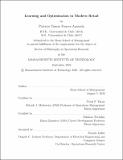| dc.contributor.advisor | Farias, Vivek F. | |
| dc.contributor.advisor | Trichakis, Nikolaos | |
| dc.contributor.author | Foncea Araneda, Patricio Tomas | |
| dc.date.accessioned | 2023-01-19T19:48:58Z | |
| dc.date.available | 2023-01-19T19:48:58Z | |
| dc.date.issued | 2022-09 | |
| dc.date.submitted | 2022-08-09T19:38:48.277Z | |
| dc.identifier.uri | https://hdl.handle.net/1721.1/147419 | |
| dc.description.abstract | The general topic of this thesis is the application of optimization and statistical inference methods to practical industry problems in the domains of supply chain, demand estimation, assortment optimization, and experimentation. We develop new methodologies that improve the practice of operations management for retailers and wholesalers, testing and implementing them in partnership with industry collaborators.
We begin by tackling the problem faced by an online retailer that receives orders sequentially and must decide from which of its warehouses to ship each item in the order. Each warehouse has a limited inventory and the retailer must balance the trade-off between immediate cost of shipping with future inventory availability. We formulate it as an online optimization problem and propose a novel primal-dual algorithm with provable performance guarantees that is robust to the demand process and does not require any explicit forecast.
We then turn our attention to the problem of learning customer preferences using aggregated demand from multiple products and stores. Although we rely on traditional choice model techniques, the novelty of our approach is the inclusion of a low-rank term in the utility model that aims to capture non-observable characteristics as latent features. This not only improves the overall fit of our demand estimation model, but also helps addressing endogeneity of our regressors without the need of instrumental variables. Once we have a demand model in place, we can use it to forecast customer behavior and make decisions that bring positive predicted outcomes. We develop algorithms that solve the assortment optimization problem when using complex choice models, and the problem of optimally allocating shelf space. These algorithms are efficient and scalable, and we show how our industry collaborator is currently implementing these in their business operations.
Finally, we study the problem of measuring the effect of interventions in largescale retail. We design an experimentation platform for a large wholesaler that applies promotions at store level. We apply a generalized version of synthetic control to find treatment effects and show that these estimates are more reliable and accurate than the ones obtained with current methodologies used by industry practitioners. | |
| dc.publisher | Massachusetts Institute of Technology | |
| dc.rights | In Copyright - Educational Use Permitted | |
| dc.rights | Copyright MIT | |
| dc.rights.uri | http://rightsstatements.org/page/InC-EDU/1.0/ | |
| dc.title | Learning and Optimization in Modern Retail | |
| dc.type | Thesis | |
| dc.description.degree | Ph.D. | |
| dc.contributor.department | Massachusetts Institute of Technology. Operations Research Center | |
| dc.contributor.department | Sloan School of Management | |
| mit.thesis.degree | Doctoral | |
| thesis.degree.name | Doctor of Philosophy | |
